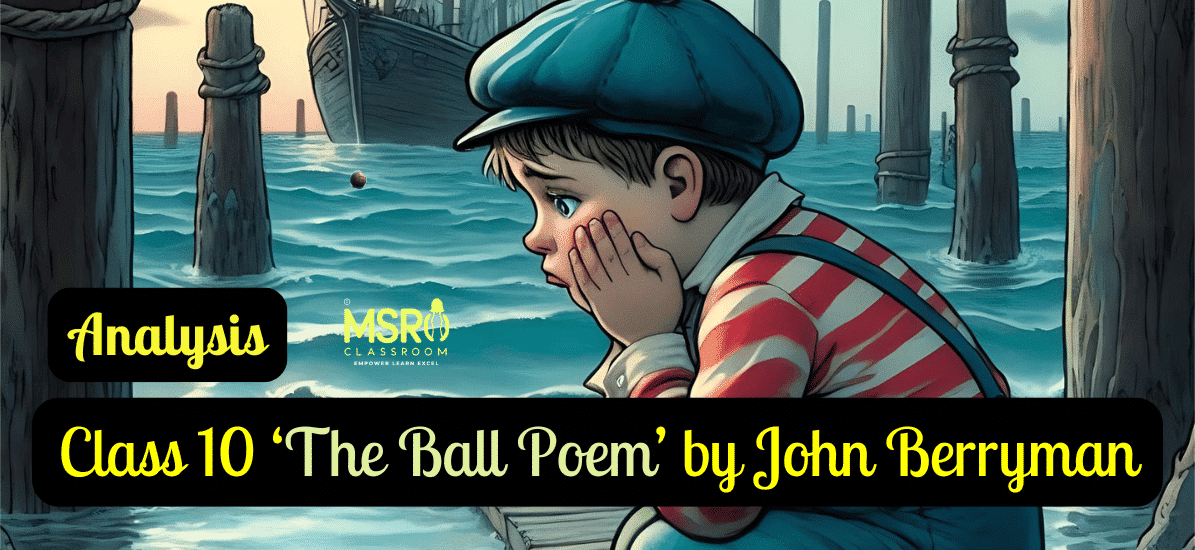Poem 5, John Berryman’s ‘The Ball Poem, ‘ Summary, Theme, Literary Devices, Line-by-Line Explanation, Extra Questions, and Extract-Based Questions.
Poem 5- The Ball Poem by John Berryman:
John Berryman
John Berryman (1914-1972) was a prominent American poet known for his confessional style. His most famous works explore themes of identity, despair, and the human condition. Berryman’s life was marked by personal struggles, including alcoholism and mental illness, which often influenced his poetry.

Table of Contents
Next on First Flight: Chapter 5- ‘From the Diary of Anne Frank‘ , Poem 6- ‘Amanda!‘ by Robin Klein,
Summary ‘The Ball Poem’:
“The Ball Poem” by John Berryman reflects on loss and the challenges of growing up. It tells the story of a young boy who loses his ball, which represents childhood innocence and joy. As he watches it roll into the water, he realizes that losing things is a part of life, and material possessions are fragile.
The poem portrays the boy’s emotional struggle as he comes to terms with responsibility and the impermanence of things. Through his sadness, he confronts loss and understands that everyone experiences it. Berryman’s poem highlights themes of maturity, strength, and the challenging process of accepting that life is constantly changing.
Explanation of ‘The Ball Poem’ for Auditory Learners:
Duration: 15 minutes
Note for Learners:
‘The Ball Poem’ by John Berryman may seem simple at first glance, but it carries deep emotional and philosophical meaning. This poem is a crucial part of the Class 10 English syllabus and is frequently asked in exams.
To help you truly understand it, this 15-minute video covers all key chapters — including the summary, line-by-line explanation, themes, symbolism, and more.
It is strongly advised not to skip any section, as each part builds your understanding step by step.
Central Idea: The Ball Poem:
“The Ball Poem” beautifully delves into the theme of loss, inviting us to reflect on our own experiences. Through the simple yet poignant story of a young boy losing his ball, we witness a range of powerful emotions—grief, despair, and ultimately acceptance. This heartfelt journey mirrors a universal experience: the bittersweet reality of impermanence can shake our innocence, but it also opens doors to growth. As the boy learns to embrace the inevitability of loss, he discovers valuable lessons in responsibility and resilience.
The poem encourages us to see loss not merely as an ending but as a transformative opportunity. It reminds us that facing our losses with courage is a vital part of our shared human experience, enriching our lives and deepening our understanding of ourselves and the world around us.
Justification of the Poem’s Title:
The title “The Ball Poem” effectively captures the main idea of the poem. The ball represents innocence, childhood joy, and the temporary nature of life’s pleasures. While a ball is a simple object for children’s play, it also symbolizes loss and the challenges of growing up.
The poem utilises the loss of the ball to explore themes of impermanence, grief, and the universal experience of navigating life’s complexities. Therefore, the title clearly relates to the main object in the poem and suggests deeper meanings about the human experience.
Analysis of ‘The Ball Poem’:
John Berryman’s poem ‘The Ball Poem’ is a poignant exploration of loss and the harsh realities of growing up. In this short poem, Berryman vividly portrays a moment in a young boy’s life when he experiences the loss of his ball and the more profound lesson it imparts. Here is a detailed analysis of the poem:
- Loss and Grief: The poem asks, “What is the boy now, who has lost his ball?” This immediately sets the tone for the poem, addressing a loss situation. The loss of the ball symbolises a common childhood experience, but it also serves as a metaphor for the larger losses and disappointments we face.
- Vivid Imagery: Berryman employs vivid imagery to describe the ball’s journey. The ball is seen “Merrily bouncing down the street,” which creates a sense of joyful innocence and playfulness. However, this joy abruptly contrasts with the stark reality that the ball has ended up “in the water.”
- No Comfort in Replacements: The poem challenges the idea that loss can be easily mitigated. The boy’s grief is so profound that it cannot be consoled by the notion that “there are other balls.” This loss is presented as ultimate and irreplaceable.
- Responsibility: The poem suggests this experience is pivotal in the boy’s life. It is a moment of awakening, as the boy senses “first responsibility.” This introduces the idea that he is learning a crucial life lesson about the impermanence of things and the responsibility of owning them.
- External Value of Money: The poem explores the notion that money serves as an external measure of value. While the boy might be offered a dime to buy another ball, this is insufficient in the face of his grief. The loss is not just about the physical object; it’s about the emotional attachment.
- Epistemology of Loss: The poem’s final lines introduce the concept of “the epistemology of loss,” which refers to the philosophical study of how we come to know and understand loss. The boy is learning how to “stand up” in the face of loss, a skill that every person must acquire as they grow up.
- Universal Experience: ‘The Ball Poem’ captures a universal experience of loss and growing up. While it focuses on a specific moment in a child’s life, it resonates with readers of all ages who have faced loss and learned to cope with it.
Tone:
The poem beautifully captures a deep, reflective tone, inviting us to explore the bittersweet journey of growing up. Through vivid language and imagery, it conveys heartfelt emotions of loss and nostalgia, emphasising the young boy’s poignant experience of losing his ball. The philosophical poem encourages us to embrace the complexities of life, honouring both the sadness and the growth that come with our transitions. It’s a touching reminder of the memories that shape us.
Type:
‘The Ball Poem’ is a lyric poem. It’s a short, emotionally charged poem expressing the poet’s thoughts and emotions. It’s a reflective and introspective piece that delves into the inner world of the narrator and the young boy. It can also be considered a coming-of-age poem, as it explores the boy’s first encounter with responsibility and the loss of childhood innocence.
Structure:
‘The Ball Poem’ by John Berryman is a brief, free-verse poem with no distinct stanzas or formal structure. The lines flow continuously without breaking, and the poem is presented as a unified text. This structure aligns with the poem’s theme of loss and the boy’s emotional experience, emphasising the raw and unbroken flow of the boy’s thoughts and feelings as he grapples with the loss of his ball. Berryman’s free-verse structure allows for a more fluid and organic expression of the boy’s emotional turmoil and the poem’s reflective tone.
Theme ‘The Ball Poem’:
- Loss and Impermanence: The poem opens with the loss of the boy’s ball, quickly emphasising the significance of this loss to the child. The bouncing ball is a metaphor for the transitory nature of childhood innocence and joy. The poem highlights how loss is an inevitable part of life and the boy’s realisation that “Balls will be lost always” underscores the impermanence of youth and happiness.
- Responsibility: As the boy watches his ball sink into the water, he experiences a sense of responsibility for the first time. The loss of his ball is a metaphor for growing up and facing the consequences of one’s actions. This newfound responsibility is a part of the boy’s journey, as he learns that life involves taking care of one’s possessions and dealing with the consequences of one’s actions.
- Epistemology of Loss: The poem suggests that the boy is learning the “epistemology of loss,” which refers to the philosophical study of knowledge and how we understand things. In this context, the boy is gaining a deeper understanding of the nature of loss and how it shapes one’s perspective on life. The poem portrays the boy’s painful realisation of the irreplaceability of what he has lost.
- Transition to Adulthood: The poem hints at the boy’s transition from childhood to adulthood. He is learning a lesson that all people must eventually confront, and this process of growing up involves accepting the inevitability of loss and learning how to cope with it.
‘The Ball Poem’ by John Berryman is a concise yet emotionally powerful poem that explores the themes of loss, responsibility, and the inevitability of growing up. Through vivid imagery and evocative language, Berryman portrays a young boy’s encounter with a difficult life lesson, making it a relatable and thought-provoking piece of poetry.
Line-by-Line Explanation ‘The Ball Poem’:
- “What is the boy now, who has lost his ball,”
The poem begins with a question about the current state of a boy who has lost his ball. The ball symbolises something precious to the boy.
- “What, what is he to do? I saw it go”
The speaker wonders what the boy will do in the face of this loss. He witnessed the ball being lost.
- “Merrily bouncing down the street, and then”
The ball bounced joyfully along the street before it was lost, emphasising its cheerful and carefree nature.
- “Merrily over — there it is in the water!”
The ball ended up in the water, implying it was irretrievable, perhaps sunk or ruined.
- “No use to say ‘O there are other balls’:”
The speaker dismisses suggesting that plenty of other balls replace the lost one. Such reassurances are of no comfort to the boy.
- “An ultimate shaking grief fixes the boy”
The boy is deeply affected by losing his ball. He experiences profound grief and shock.
- “As he stands rigid, trembling, staring down”
The boy is depicted as standing still, trembling, and fixated on the spot where his ball disappeared into the water.
- “All his young days into the harbour where”
The loss of the ball defines the boy’s early experiences, as he is emotionally and mentally drawn to the harbour where it went.
- “His ball went. I would not intrude on him;”
The speaker shows empathy and restraint, choosing not to interfere with the boy’s grief.
- “A dime, another ball, is worthless. Now”
The speaker acknowledges that material replacements like money and another ball cannot fill the void left by the lost ball.
- “He senses first responsibility”
The boy is beginning to understand the concept of responsibility.
- “In a world of possessions. People will take”
The loss of the ball teaches the boy about the transient nature of possessions and how people may take things away from us.
13. “Balls, balls will be lost always, little boy.”
The speaker conveys that losing something, like balls, is a common and inevitable part of life, and the boy must accept this reality.
14. “And no one buys a ball back. Money is external.”
The speaker emphasizes that money cannot buy back lost things, and material wealth is external, not a solution to emotional loss.
15. “He is learning, well behind his desperate eyes,”
The boy slowly grasps the harsh truth, although his outward appearance may still reflect his desperation and grief.
16. “The epistemology of loss, how to stand up”
The boy is coming to understand the nature of loss and learning how to cope and move forward.
17.”Knowing what every man must one day know”
The boy is learning a universal lesson about loss that every person will face at some point in life.
18. “And most know many days, how to stand up.”
The poem concludes with the idea that most people experience loss many times and must learn how to cope and stand up in the face of it.
Literary Devices “The Ball Poem”:
Question Answers “The Ball Poem”:
Textbook Question Answers:
Q1: Why does the poet say, “I would not intrude on him”? Why doesn’t he offer him money to buy another ball?
A1: The poet says, “I would not intrude on him” to convey that the boy is deeply absorbed in his emotional turmoil. The poet recognises the profound grief and sense of responsibility that the boy is experiencing, and he respects the boy’s need for solitude and reflection during this moment of loss.
The poet doesn’t offer the boy money to buy another ball because he understands that the loss is not just about the physical object but also about the emotional attachment and the lesson the boy is learning. Money cannot fully compensate for the sentimental value of the lost ball, and the poet understands that this experience is a valuable lesson in coping with loss and growing up.
Q2: “… staring down/All his young days into the harbour where/His ball went …” Do you think the boy has had the ball for a long time? Is it linked to the memories of days when he played with it?
A2: The lines “staring down/All his young days into the harbour where/His ball went” suggest that the boy has had the ball for a significant amount of time, which likely holds sentimental value for him. The phrase “staring down/All his young days” implies that the boy has spent much of his childhood playing with this ball. The loss of the ball is not just a physical object but also the loss of his youth’s associated memories and experiences. The ball is linked to the boy’s memories of the days he played with it, making its loss all the more emotionally impactful.
Q3: What does “in the world of possessions” mean?
A3: “In the world of possessions” refers to the context or environment where material items or objects are valued and considered necessary. It implies a societal or cultural perspective that places significance on owning and having material things. In the context of the poem, it suggests that the boy is beginning to understand the responsibilities and attachments that come with owning and losing possessions, and he is learning this within the framework of a society that values material belongings.
Q4: Do you think the boy has lost anything earlier? Pick out the words that suggest the answer.
A4: No, there are hints in the poem that suggest the boy might not have experienced loss before. Words that imply this include:
- “An ultimate shaking grief”
- “How to stand up”
- “Knowing what every man must one day know”
- “And most know many days”
These phrases suggest a deeper understanding of loss beyond the immediate experience with the ball. “An ultimate shaking grief” implies a profound, perhaps previously experienced sorrow. “Knowing what every man must one day know” and “most know many days” suggest recognition of universal human experiences, indicating the boy may have encountered loss or hardship before. “How to stand up” implies resilience learned from previous challenges.
Q5: What does the poet say the boy is learning from the loss of the ball? Try to explain this in your own words.
A5: The poet suggests that the boy is learning about the concept of loss and its broader implications. Beyond the immediate disappointment of losing his ball, the boy is learning about responsibility and the inevitability of losing things in life. This experience teaches him to confront the reality of impermanence and to stand up resiliently in the face of loss.
Q6: Have you ever lost something you liked very much? Write a paragraph describing how you felt then, and saying whether — and how — you got over your loss.
Sample Paragraph:
| Yes, I’ve experienced losing something I cherished deeply. Losing the vintage pen my grandfather gave me was a deeply saddening experience. It held sentimental value, representing a cherished connection to him. When I realised it was missing, I felt a profound sense of loss and sadness, as if a part of my heritage had vanished. Initially, I searched, hoping to recover it, but I accepted its absence as time passed. While the pain lingered, I found solace in memories of my grandfather and the moments we shared. Eventually, I realised that while the physical pen was gone, the sentiment behind it remained intact. Over time, I learned to appreciate the memories it evoked and the lessons it imparted, allowing me to move forward while treasuring its significance in my heart. |
Extra Questions “The Ball Poem”:
Q1: What is the central theme of the poem?
A1: The poem’s central theme is the profound impact of loss and the process of learning how to cope with it.
Q2: How does the poet describe the boy’s emotional state after losing his ball?
A2: The poet describes the boy’s emotional state as “ultimate shaking grief.” The loss of the ball leaves the boy trembling and fixated on it.
Q3: What does the poet suggest about the value of money in the poem?
A3: The poet suggests that money is external and cannot replace the sentimental value of what is lost. It’s implied that money cannot buy back the lost ball or fully ease the boy’s grief.
Q4: How does the poem explore the idea of responsibility?
A4: The poem touches upon the idea of responsibility by showing how the boy is learning to take responsibility for his possessions and the losses that come with them.
Q5: What does the poem’s phrase “epistemology of loss” mean?
A5: The phrase “epistemology of loss” refers to understanding and coming to terms with loss, how it affects us, and how it’s an inevitable part of life.
Q6: How does the poet use the image of the lost ball to convey a more profound, universal message?
A6: The lost ball serves as a metaphor for the inevitability of loss in life. The poet uses this simple, relatable event to convey a more profound message about how individuals must learn to accept and confront loss, a universal human experience.
Q7: What is the significance of the title ‘The Ball Poem’?
A7: The title, ‘The Ball Poem,’ suggests that the poem is focused on a seemingly simple and mundane object. Still, it is a gateway to explore complex themes of loss, responsibility, and human emotions.
Q8: How does the poem emphasise the boy’s transition into adulthood?
A8: The poem emphasises the boy’s transition into adulthood by portraying his initial encounter with loss and the responsibility of owning and losing possessions. It signifies a step in his growth and understanding of the world.
Q9: What does the poem suggest about the permanence of loss?
A9: The poem suggests that loss is permanent, and once something is lost, it cannot be fully reclaimed or replaced, even though people will take and lose balls throughout their lives.
Q10: How does the poet use imagery to convey the emotional impact of the boy’s loss?
A10: The poet uses imagery such as the boy standing rigid and staring down into the harbour where the ball went to vividly portray the emotional impact of the loss, creating a sense of grief and fixation.
Q11: How does the poem depict the boy’s initial reaction to losing his ball?
A11: The poem suggests that the boy’s initial reaction to losing his ball is shock and disbelief. He watches as the ball bounces merrily down the street and then abruptly into the water, leaving him rigid and trembling, unable to comprehend the loss.
Q12: What emotions does the boy experience as he stands by the harbour?
A12: As the boy stands by the harbour, he experiences profound grief and sadness. The poem describes him as having “ultimate shaking grief,” indicating the depth of his emotional turmoil as he stares down into the water where his ball disappeared.
Q13: How does the poem explore the concept of responsibility in the face of loss?
A13: The poem explores the concept of responsibility by suggesting that the boy is learning about it through the experience of loss. Losing his ball teaches him that in a world of possessions, people will take things, and things will be lost, prompting him to recognise the need for responsibility in caring for his belongings.
Q14: What does the ball symbolise in the poem?
A14: In the poem, the ball symbolises innocence, childhood joy, and the transient nature of life’s pleasures. It is a tangible representation of the boy’s fleeting happiness and the harsh reality of impermanence and loss.
Q15: What is the boy’s central lesson from losing his ball?
A15: The central lesson the boy learns from losing his ball is the epistemology of loss — the understanding that loss is an inherent part of life and that one must learn to accept and cope with it. Through this experience, he gains a deeper understanding of responsibility and resilience, ultimately learning how to stand up in the face of loss.
Q16: How does the poet convey the theme of impermanence through the boy’s experience?
A16: The poet conveys the theme of impermanence through the boy’s experience by highlighting loss’s sudden and unexpected nature. The boy’s joy at playing with his ball is abruptly shattered when it bounces into the water, emphasising the fleeting nature of happiness and the reality that possessions can be lost at any moment.
Q17: What does the poem’s phrase “the epistemology of loss” refer to?
A17: The phrase “the epistemology of loss” refers to the understanding or study of loss and its implications. The poem suggests that the boy is learning about the nature of loss and its profound impact on one’s perception of the world. It encompasses the knowledge and wisdom gained through experiencing loss.
Q18: Why does the boy’s loss of the ball lead to a sense of “ultimate shaking grief”?
A18: The boy’s loss of the ball leads to a sense of “ultimate shaking grief” because the ball holds significant meaning to him. It represented not just a possession but also his innocence, joy, and connection to childhood. The sudden and irrevocable loss of something cherished evokes a deep emotional response, causing the boy to experience intense grief and sadness.
Q19: How does the poem suggest that loss is a universal experience?
A19: The poem suggests that loss is a universal experience by portraying the boy’s reaction to losing his ball as a metaphor for the broader human experience of loss. Through his grief and struggle to come to terms with the loss, the poem reflects on the common emotions and challenges individuals face when confronted with the impermanence of life and the inevitability of loss.
Q20: What is the significance of the final line, “How to stand up,” in the context of the poem?
A20: The final line, “How to stand up,” holds significance in the poem’s context as it encapsulates the boy’s central lesson from losing his ball. It symbolises resilience and the ability to confront and overcome challenges. By learning how to stand up in the face of loss, the boy gains a deeper understanding of responsibility and resilience, ultimately growing emotionally stronger from the experience.
Extract Based Questions Answers “The Ball Poem”:
Extract 1:
“What is the boy now, who has lost his ball,
What, what is he to do?”
Q1: How does the poet emphasise the boy’s state of mind immediately after losing his ball?
A1: The poet emphasises the boy’s emotional turmoil by asking what he should do after losing his ball, indicating his confusion and distress.
Q2: What does the repetition of “What” in the first two lines suggest about the boy’s predicament?
A2: The repetition of “What” underscores the boy’s deep sense of loss and his need for guidance or a solution to his distressing situation.
Extract 2:
“No use to say ‘O there are other balls’:
An ultimate shaking grief fixes the boy”
Q1: Why does the poet dismiss the idea of suggesting that there are other balls to the boy?
A1: The poet dismisses the idea because the loss has caused the boy profound grief that the presence of other balls can’t quickly console. It’s not just about the object but the emotional attachment.
Q2: How does “ultimate shaking grief” describe the boy’s emotional state?
A2: The phrase “ultimate shaking grief” vividly portrays the intensity of the boy’s emotional distress, indicating that the loss has deeply affected him.
Extract 3:
“He is learning, well behind his desperate eyes,
The epistemology of loss, how to stand up”
Q1: What does the poet mean by “the epistemology of loss” in this context?
A1: The poet implies that the boy is learning about the nature and understanding of loss – not just the loss itself but the knowledge and experience of it.
Q2: How does the phrase “well behind his desperate eyes” reflect the boy’s emotional journey?
A2: The term suggests that the boy’s outward appearance may not fully convey the depth of his inner emotional turmoil. It highlights the contrast between his outward demeanour and his internal emotional struggle.
Extract 4:
“Knowing what every man must one day know
And most know many days, how to stand up.”
Q1: What does the poet imply about the universality of the boy’s experience of loss?
A1: The poet suggests that the boy’s loss experience is universal, and every person must eventually face and learn how to cope with loss.
Q2: How does “standing up” symbolise the boy’s growth and understanding in the poem?
A2: “Standing up” implies the boy’s resilience and ability to face and overcome life’s challenges and losses, marking his growth and maturation.
Q3: How does the phrase “how to stand up” symbolise the poem’s central theme?
A3: The phrase “how to stand up” symbolises the boy’s growth, resilience, and ability to confront life’s challenges, especially those involving loss. It represents a universal theme of learning to face adversity and continue forward.
Extract 5:
“People will take
Balls, balls will be lost always, little boy.”
Q1: What is the poet suggesting about the inevitability of loss in these lines?
A2: The poet means that in life, people will take things from us, and objects, like balls, will always be lost. It emphasises that loss is a common and unavoidable human experience.
Q1: Why does the poet address the boy as a “little boy” in these lines?
A2: Referring to the boy as a “little boy” emphasises his youth and innocence, underscoring his vulnerability and inexperience in dealing with loss and responsibility.
Extract 6:
“I saw it go
Merrily bouncing, down the street, and then
Merrily over — there it is in the water!”
Q1: How does using the word “merrily” in these lines contrast with the boy’s later grief?
A1: The word “merrily” in these lines contrasts vividly with the boy’s later grief, highlighting the abrupt shift from a joyful, carefree moment to a state of distress.
Q2: What does the poet’s observation of the ball’s path contribute to the poem’s overall message?
A2: Observing the ball’s trajectory underscores the suddenness of the loss and the unpredictability of life, adding to the thematic exploration of the boy’s emotional journey.
Q3: How does the repetition of “merrily” in these lines affect the tone of the poem?
A3: The repetition of “merrily” creates a sharp contrast between the initial joy of the ball’s movement and the eventual loss, intensifying the poem’s sense of loss and grief.
Extract 7:
“I would not intrude on him;
A dime, another ball, is worthless. Now”
Q1: Why does the poet not intrude on the boy’s grief?
A1: The poet refrains from intruding to respect the boy’s need for solitude and reflection during his loss. It shows an understanding of the boy’s emotional state.
Q2: What does the poet mean by “a dime, another ball, is worthless” in these lines?
A2: The poet suggests that material replacements like money or another ball cannot fill the lost ball’s emotional void, highlighting the loss’s more profound, non-material significance.
Extract 8:
“He senses first responsibility
In a world of possessions. People will take”
Q1: How does the loss of the ball introduce the concept of responsibility in the boy’s life?
A1: The loss of the ball makes the boy aware of the responsibility of owning possessions, as he realises the potential for loss and the need to take care of his belongings.
Q2: What does the phrase “In a world of possessions” imply about the society in which the boy lives?
A2: The phrase suggests that society places significant importance on material possessions, and individuals must learn to navigate the challenges and responsibilities of owning such possessions.
Extract 9:
“And no one buys a ball back. Money is external.”
Q1: What does the poet mean by “Money is external” in these lines?
A1: The poet emphasises that money cannot return what has been lost. It’s an external or material solution, and it cannot replace the sentimental or emotional value of the lost object.
Q2: What is the significance of the statement “no one buys a ball back” in the poem?
A2: This statement underscores the permanence of loss and the fact that some things cannot be recovered or replaced, even with material resources. It reinforces the theme of loss’s enduring impact.
Extract 10:
“An ultimate shaking grief fixes the boy
As he stands rigid, trembling, staring down
All his young days into the harbour where
His ball went. “
Q1: How does the poet describe the boy’s emotional state after losing his ball in these lines?
A1: The poet describes the boy’s emotional state as consumed by “an ultimate shaking grief.” He portrays the boy as rigid, trembling, and fixated on where his ball has gone into the harbour, emphasising the depth of his emotional turmoil and loss.
Q2: What does the act of the boy “staring down all his young days into the harbor” symbolise in the poem?
A2: The boy staring into the harbour where his ball has gone tells the boy’s deep attachment to the lost object and the overwhelming feeling of nostalgia and longing. It represents his loss of innocence and a poignant connection to his past.
Some links on this page may be affiliate links. This helps support MSRO Classroom at no additional cost to readers.









